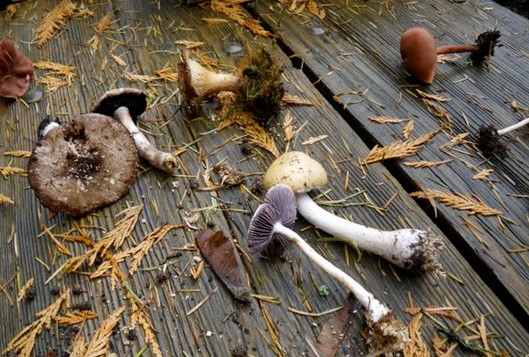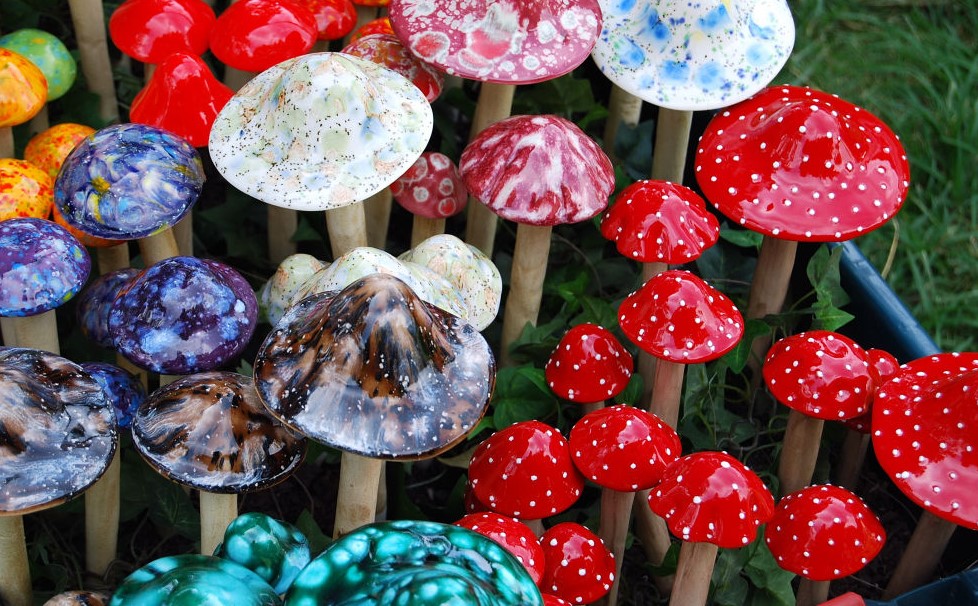Also Known As: Magic mushrooms are also known as shrooms, mushies, blue meanies, golden tops, liberty caps, philosopher’s stones, liberties, amani, and agaric.
Drug Class: Psilocybin is classified as a hallucinogen.
Common Side Effects: Magic mushrooms are known to cause nausea, yawning, feeling relaxed or drowsy, introspective experience, nervousness, paranoia, panic, hallucinations, and psychosis.
Shrooms (also called Magic mushrooms or mushrooms) are a type of mushroom that contains the drugs psilocybin or psilocin. These drugs cause hallucinations. Psilocybin powder can also come in capsule form. It are wild or cultivated mushrooms that contain psilocybin, a naturally-occurring psychoactive and hallucinogenic compound. Psilocybin is considered one of the most well-known psychedelics, according to the Substance Abuse and Mental Health Services Administrations.

Psilocybin is classified as a Schedule I drug, meaning that has a high potential for misuse and has no currently accepted medical use in treatment in the United States.
You can eat mushrooms in fresh or dried form. Powdered psilocybin can be snorted or injected. Mushrooms can also be:
- steeped into tea
- added to cooked foods
- added to fruit juice (if powdered)
Some mushrooms that look like psilocybin mushrooms are poisonous. If you eat a poisonous mushroom, you could damage your liver or even die.
It is against the law to grow, sell, or carry mushrooms. If you get caught, you could be fined or even go to jail.
Risks
People who have taken psilocybin in uncontrolled settings might engage in reckless behavior, such as driving while intoxicated.
Some people may experience persistent, distressing alterations to the way they see the world. These effects are often visual and can last from anywhere from weeks to years after using the hallucinogen.
Physicians now diagnose this condition as hallucinogen persisting perception disorder (HPPD), also known as a flashback. A flashback is a traumatic recall of an intensely upsetting experience. The recollection of this upsetting experience during hallucinogen use would be a bad trip, or a hallucination that takes a disturbing turn.
Some individuals experience more unpleasant effects than hallucinations, such as fear, agitation, confusion, delirium, psychosis, and syndromes that resemble schizophrenia, requiring a trip to the emergency room.
In most cases, a doctor will treat these effects with medication, such as benzodiazepines. These effects often resolve in 6 to 8 hours as the effects of the drug wear off.
Finally, though the risk is small, some psilocybin users risk accidental poisoning from eating a poisonous mushroom by mistake.
Symptoms of mushroom poisoning may include muscle spasms, confusion, and delirium. Visit an emergency room immediately if these symptoms occur.
Because hallucinogenic and other poisonous mushrooms are common to most living environments, a person should regularly remove all mushrooms from areas where children are routinely present to prevent accidental consumption.
Most accidental mushroom ingestion results in minor gastrointestinal illness, with only the most severe instances requiring medical attention.
How to Recognize Shrooms
Mushrooms containing psilocybin look liked dried ordinary mushrooms with long, slender stems that are whitish-gray and dark brown caps with light brown or white in the center. Dried mushrooms are rusty brown with isolated areas of off-white.
Magic mushrooms can be eaten, mixed with food, or brewed like tea for drinking. They can also be mixed with cannabis or tobacco and smoked. Liquid psilocybin is also available, which is the naturally occurring psychedelic drug found in liberty caps. The liquid is clear brown and comes in a small vial.
What Do Magic Mushrooms Do?
Magic mushrooms are hallucinogenic drugs, meaning they can cause you to see, hear, and feel sensations that seem real but are not. The effects of magic mushrooms, however, are highly variable and believed to be influenced by environmental factors.
Shrooms have a long history of being associated with spiritual experiences and self-discovery. Many believe that naturally occurring drugs like magic mushrooms, weed, and mescaline are sacred herbs that enable people to attain superior spiritual states. Others take magic mushrooms to experience a sense of euphoria, connection, and a distorted sense of time.
The psilocybin found in shrooms is converted to psilocin in the body and is believed to influence serotonin levels in the brain, leading to altered and unusual perceptions. The effects take 20 to 40 minutes to begin and can last up to 6 hours—the same amount of time it takes for psilocin to be metabolized and excreted.
A number of factors influence the effects of magic mushrooms, including dosage, age, weight, personality, emotional state, environment, and history of mental illness.
What are the short-term effects of mushrooms?
Side effects of magic mushrooms can include both physical and mental effects.
Physical effects:
- Dilated pupils
- Drowsiness
- Headaches
- Increased heart rate, blood pressure, and temperature
- Lack of coordination
- Muscle weakness
- Nausea
- Yawning
Mental effects:
- Distorted sense of time, place, and reality
- Euphoria
- Hallucinations (visual or auditory)
- Having introspective (spiritual) experiences
- Panic reactions
- Paranoia
- Psychosis
- Nervousness
Possible effects of psilocybin include:
- euphoria
- peacefulness
- spiritual awakening
- quickly changing emotions
- derealization, or the feeling that your surroundings are not real
- depersonalization, or a dream-like sense of being disengaged from your surroundings
- distorted thinking
- visual alteration and distortion, such as halos of light and vivid colors
- dilated pupils
- dizziness
- drowsiness
- impaired concentration
- muscle weakness
- lack of coordination
- unusual body sensations
- nausea
- paranoia
- confusion
- frightening hallucinations
- vomiting
- yawning
The effects of psilocybin vary between people, based on differences in the mental state and personality of the user and the immediate environment.
If the recreational user experiences issues with mental health or feels anxious about using the hallucinogen, they face a higher risk of having a bad experience.
Psychological distress is the adverse event most often reported after recreational use of psilocybin. This distress can take the form of extreme anxiety or short-term psychosis.
More research is needed on the long-term, lasting side effects of magic mushrooms but it has been reported that users can experience long-term changes in personality, as well as flashbacks long after taking mushrooms.
Since magic mushrooms look similar to poisonous mushrooms, poisoning is yet another potential risk of taking these drugs. Mushroom poisoning can cause severe illness, organ damage, and even death.
It’s also common for magic mushroom products to be contaminated. A study of 886 samples alleged to be psilocybin mushrooms analyzed by Pharm Chem Street Drug Laboratory showed that only 252 (28%) were actually hallucinogenic, while 275 (31%) were regular store-bought mushrooms laced with LSD or phencyclidine (PCP), and 328 (37%) contained no drug at all.
You can feel the effects of mushrooms in about 30 minutes and they last about 3 to 6 hours. The effects are strongest (the peak) during the first 3 to 4 hours.
Mushrooms can change the way you see, smell, hear, taste, and touch (e.g., you might think you can see music or hear colours). Your body might feel very heavy or very light. You might feel like you are having a magical or religious experience. While taking mushrooms, you might also:
- have high blood pressure
- have a faster heart rate
- feel dizzy or light-headed
- shiver and have the chills
- feel anxious
- have an upset stomach (nausea) or vomit
- have a numb tongue and mouth
Sometimes the effects of mushrooms can be overwhelming and scary (a bad trip). If someone is having a bad trip, try to help them with calm reassurance.
What are the long-term effects of mushrooms?
Don’t use mushrooms if you are pregnant. It is not known how mushrooms affect pregnant women and the growing baby. Mushrooms sometimes have other drugs added that can harm your baby.
Taking mushrooms with other drugs or alcohol may increase your risk for other health problems.
Psilocybin is a hallucinogen that works by activating serotonin receptors, most often in the prefrontal cortex. This part of the brain affects mood, cognition, and perception.
Hallucinogens work in other regions of the brain that regulate arousal and panic responses. Psilocybin does not always cause active visual or auditory hallucinations. Instead, it distorts how some people that use the drug perceive objects and people already in their environment.
The quantity of the drug, past experiences, and expectations of how the experience will take shape can all impact the effects of psilocybin.
After the gut ingests and absorbs psilocybin, the body converts it to psilocyn. The hallucinogenic effects of psilocybin usually occur within 30 minutes of ingestion and last between 4 and 6 hours.
In some individuals, the changes in sensory perception and thought patterns can last for several days.
Mushrooms containing psilocybin are small and usually brown or tan. In the wild, people often mistake mushrooms containing psilocybin for any number of other mushrooms that are poisonous.
People usually consume psilocybin as a brewed tea or prepare it with a food item to mask its bitter taste. Manufacturers also crush dried mushrooms into a powder and prepare them in capsule form. Some people who consume these mushrooms cover them with chocolate.
The potency of a mushroom depends on:
- the species
- origin
- growing conditions
- harvest perio
- whether a person eats them fresh or dried
The amount of active ingredients in dried mushrooms is about 10 times higher than the amount found in their fresh counterparts.
Extent of use
In the U.S., the National Survey on Drug Use and Health (NSDUH) suggested that, between 2009 and 2015, around 8.5 percent of people reported using psilocybin at some point in their life.
When people use psilocybin, it is usually at dance clubs or in select groups of people seeking a transcendent spiritual experience.
In medical settings, doctors have tested psilocybin for use in treating cluster headaches, end-stage cancer anxiety, depression, and other anxiety disorders.
However, scientists have questioned its effectiveness and safety as a therapeutic measure.
Street names for psilocybin
Drug dealers rarely sell psilocybin under its real name. Instead, the drug may be sold as:
- magic mushrooms
- shrooms
- boomers
- zoomers
- mushies
- simple Simon
- little smoke
- sacred mushrooms
- purple passion
- mushroom soup
- cubes
Psilocybin as a treatment for depression
Discussions are on-going about whether psychological specialists can use psilocybin and similar hallucinogens as a treatment for depression.
Two very recent studies have looked at psilocybin as a treatment. One study examined the ability of psilocybin to reduce depression symptoms without dulling emotions, and the other assessed the relationship between any positive therapeutic outcomes and the nature of psilocybin-induced hallucinations.
While some researchers are looking into some therapeutic uses for psilocybin, they still, at present, regard psilocybin as unsafe and illegal.

From my personal experience shrooms can cause flashbacks, even after one use. Flashbacks may be mild experiences, including changing lights or colors, or they could involve intense panic, dissociation, and even hallucinations. For me it was bad experience..
I tried shrooms recently and honestly, it was so impactful. I cried four times, no because I was sad but because I gained a new perspective on life. I’d suggest being in nature while tripping on shrooms, exploring and just observing all the plants, birds and animals were a delight in itself.
Pingback: Are shrooms illegal in canada? – Cannabis Media Blog